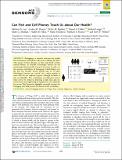Can Fish and Cell Phones Teach Us about Our Health?
Author(s)
Lee, Michael A.; Duarte, Carlos M.; Eguíluz, Víctor M.; Heller, Daniel A.; Langer, Robert; Meekan, Mark G.; Sikes, Hadley D.; Srivastava, Mani; Strano, Michael S.; Wilson, Rory P.; ... Show more Show less
DownloadPublished version (3.425Mb)
Publisher Policy
Publisher Policy
Article is made available in accordance with the publisher's policy and may be subject to US copyright law. Please refer to the publisher's site for terms of use.
Terms of use
Metadata
Show full item recordAbstract
© 2019 American Chemical Society. Biologging is a scientific endeavor that studies the environment and animals within it by outfitting the latter with sensors of their dynamics as they roam freely in their natural habitats. As wearable technologies advance for the monitoring of human health, it may be instructive to reflect on the successes and failures of biologging in field biology over the past few decades. Several lessons may be of value. Physiological sensors can "encode" for a wider number of states than the one explicitly targeted, although the limits of this are debatable. The combination of orthogonal sensors turns out to be critical to delivering a high value data set. Sensor fusion and engineering for longevity are also important for success. This Perspective highlights successful strategies for biologging that hold promise for human health monitoring.
Date issued
2019-10Department
Massachusetts Institute of Technology. Department of Chemical EngineeringJournal
ACS Sensors
Publisher
American Chemical Society (ACS)
ISSN
2379-3694